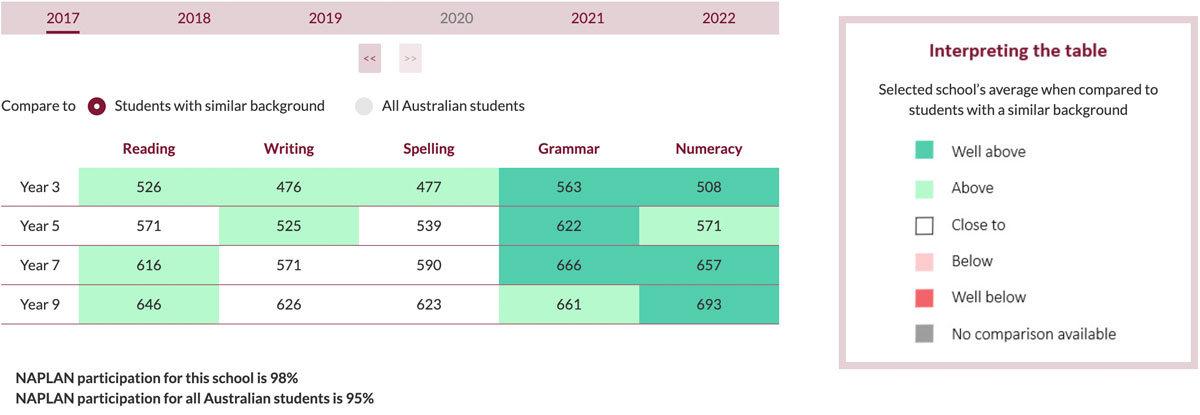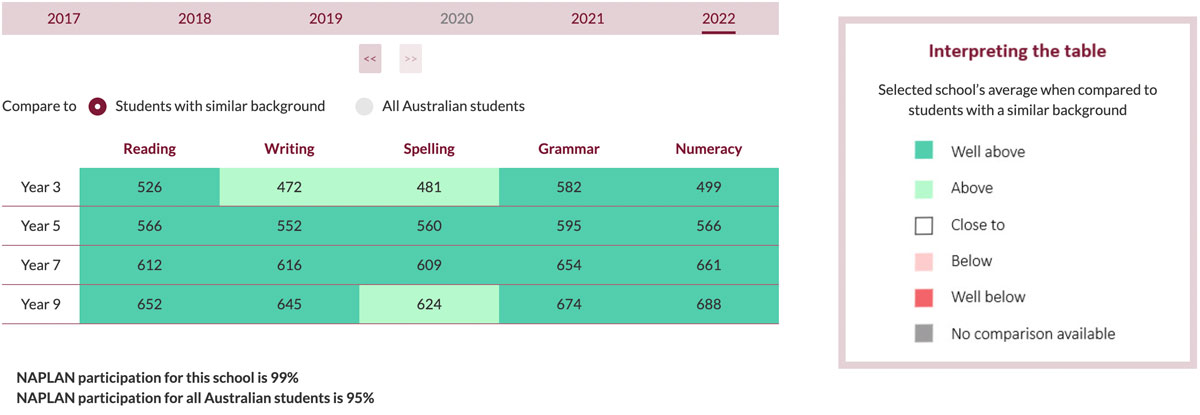Elevating your school’s writing program
Mark Scruby, Head of English at Ballarat Clarendon College, recently kicked off the Brightpath Progress Edchat series, and what a fabulous start to the series. Here are the key points from the work Mark shared with us, but I strongly recommend that you listen to his full presentation if you are looking to elevate your school’s writing program.
In 2017, Ballarat Clarendon College overhauled the way they taught English from Kindergarten to Year 12. Whilst the school did not have any particular concerns about their performance in NAPLAN in reading and writing, they felt that their students could perform at a higher level.
Figure 1 below shows Ballarat Clarendon College’s performance on NAPLAN in 2017. Compare that to the college’s performance in 2022, in Figure 2, and you can see the success that the revamp of their curriculum had on their teaching.
Figure 1: Ballarat Clarendon College’s performance on NAPLAN in 2017

Figure 2: Ballarat Clarendon College’s performance on NAPLAN in 2022

How did Ballarat Clarendon College achieve these results?
Mark explained that when overhauling their curriculum, he and his colleagues relied heavily on the teachings of Barak Rosenshine’s Principles of Instruction, E.D. Hirsch’s Why Knowledge Matters and The Writing Revolution.
Explicit teaching
Teachers are explicit about the knowledge and skills that they want students to learn. They carefully choose which writing structures students should learn, often based on the teachers’ own completion of the writing tasks ahead of the students, to determine what successful writers need.
Teachers continually model the writing process with students by demonstrating:
-
how they craft sentences and paragraphs;
-
how they go back and change the ordering of words and sentences to clarify their writing;
-
how they think about grouping information to assist their reader in following their thinking;
-
how to play with words to find the one that works best, and so on.
Guided practise is used throughout the school, I do, We do, You do and teachers reduce and increase the cognitive load to ensure students are learning at their point of need.
Teachers focus on teaching one sentence at a time. The example Mark gave was using a non-finite verb at the beginning of a sentence. They give students plenty of opportunity to practise new structures, but this practise is not a once-off exercise, but rather something they revisit when teaching the range of text types.
Running into the room, ‘Fire! Fire!’ Sandy screamed.
Drowning in the sea, lakes or dams, Australians who cannot swim are often victims during the summertime.
Wanting to promote social change, Dickens wrote ‘A Christmas Carol’ with a specific moral message.
Responding to his dismissal as Prime Minister, Gough Whitlam addressed a group of supporters and journalists.
Explicit short-term assessment
Because teachers are explicit about the knowledge and skills they want students to learn, they can be explicit about the knowledge and skills they intend to assess.
Marking students’ writing can be a very time-consuming exercise and teachers at Ballarat Clarendon College have found it is work that does not necessarily lead to better teaching. They therefore only take in student work to mark at two or three key points in a year and when they do, there are clear decisions about how they will use the information.
The time teachers save by not continually marking extended pieces of work is used for planning and ensuring that their lessons meet students’ needs.
Whilst teachers do not regularly take marking home, they continually assess their students using formative assessment strategies such as mini whiteboards. Continual formative assessment can often be seen as too complex within English teaching, however, the department successfully uses formative assessment strategies because they know exactly which structures they have taught their students and therefore what they need to check.
Medium-term assessment and program evaluation
Teachers check that students can express their knowledge and apply the skills they have learnt in end-of-cycle assessments. The school uses common assessment tasks and standardises the administration of the assessments. This is so that they can evaluate the success of the teaching and identify successful teachers who are then charged with providing professional learning for colleagues.
The College uses Brightpath Progress and Mark explained the tool helps them complete medium-term assessments of writing efficiently. They use Brightpath to check that all teachers’ marking of writing is consistent and reliable; to identify and create a bank of performances to use as a central reference; and to collect data they can use to evaluate their programs.
Interestingly, the department has made the decision to use common assessments at some period after a unit of work has been completed. Mark explained their concerns that when they schedule assessments at the end of a work unit, student learning may appear more successful than it was.
Accessing Mark’s full presentation
You can view Mark’s full presentation here.
Below are the books and resources Mark referred to:
-
E.D Hirsch, Why knowledge matters
-
Judith C. Hochman, Natalie Wexler, Doug Lemov The Writing Revolution: A Guide to Advancing Thinking Through Writing in All Subject and Grades
-
John R. Hollingworth and Silvia Ybarra, Explicit Direct Instruction; The Power of the Well-Crafted, Well-Taught Lesson
-
Barak Rosenshine’s Principles of Instruction
-
Grant Wiggins and Jay McTighe, Understanding by Design: Professional Development
-
Dylan Wiliam, Embedded Formative Assessment
For more about Brightpath Progress request a demo here.